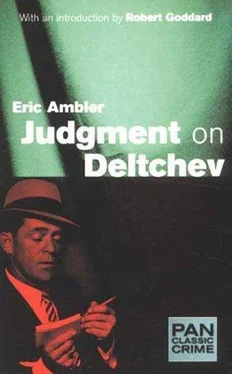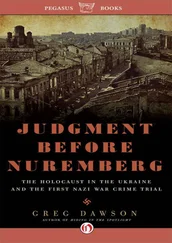Eric Ambler - Judgment on Deltchev
Здесь есть возможность читать онлайн «Eric Ambler - Judgment on Deltchev» весь текст электронной книги совершенно бесплатно (целиком полную версию без сокращений). В некоторых случаях можно слушать аудио, скачать через торрент в формате fb2 и присутствует краткое содержание. Год выпуска: 1977, ISBN: 1977, Издательство: Vintage, Жанр: Криминальный детектив, на английском языке. Описание произведения, (предисловие) а так же отзывы посетителей доступны на портале библиотеки ЛибКат.
- Название:Judgment on Deltchev
- Автор:
- Издательство:Vintage
- Жанр:
- Год:1977
- ISBN:9780307049971
- Рейтинг книги:4 / 5. Голосов: 1
-
Избранное:Добавить в избранное
- Отзывы:
-
Ваша оценка:
- 80
- 1
- 2
- 3
- 4
- 5
Judgment on Deltchev: краткое содержание, описание и аннотация
Предлагаем к чтению аннотацию, описание, краткое содержание или предисловие (зависит от того, что написал сам автор книги «Judgment on Deltchev»). Если вы не нашли необходимую информацию о книге — напишите в комментариях, мы постараемся отыскать её.
Judgment on Deltchev — читать онлайн бесплатно полную книгу (весь текст) целиком
Ниже представлен текст книги, разбитый по страницам. Система сохранения места последней прочитанной страницы, позволяет с удобством читать онлайн бесплатно книгу «Judgment on Deltchev», без необходимости каждый раз заново искать на чём Вы остановились. Поставьте закладку, и сможете в любой момент перейти на страницу, на которой закончили чтение.
Интервал:
Закладка:
‘He saw an opportunity of hitting back and he took it. Surely, that’s obvious. It was splendid.’
‘He saw an opportunity and took it, certainly. What exactly did he say finally — the last two sentences?’
I had scribbled down Deltchev’s words as he had said them. I read the last two sentences again. ‘ “I merely ask you to note that he makes wrong deductions even from facts. The fantasies that he will make from the falsehoods his case rests upon I leave to your imagination.” ’
Petlarov showed his white teeth. ‘What a clever lawyer Yordan is!’ he said. ‘Do you not see what he has done, Herr Foster? Oh, certainly he has won the sympathy of the foreign diplomatists and press representatives, and that is very nice; but what else?’
‘He made the Prosecutor look a fool.’
‘He did more. Consider. He makes the speech in German. Why?’
‘Obviously so that he would be allowed to speak. The interpreters didn’t relay what he said, of course. As far as the public was concerned, he was unintelligible. Obviously it was the American and British representatives who mattered to him, and Vukashin and the judges and Prochaska didn’t want to antagonize them unnecessarily by shutting him up. If they don’t care much anyway about Western opinion, they could afford to let him talk.’
‘If it was the American and British who mattered, why did he not speak in English? Yordan speaks very good English.’
‘Oh.’
‘The educated persons of most small nations need a second language to their own. With us it is mostly German. Many of the Party members in that courtroom speak German, and some of them are not unfriendly to Yordan. Those were the persons who interested him. What he wanted to do — and what he has done, perhaps — is to discredit the Prosecution’s evidence in advance.’
‘That’s not difficult. It discredits itself.’
‘So far, yes. But perhaps Yordan was wiser than we yet know.’
‘I don’t understand you.’
‘It is quite simple.’ He leaned forward with a chilling smile. ‘You see, Herr Foster,’ he said, ‘some of the evidence against him may not discredit itself. Some of it may be true.’
CHAPTER SEVEN
Deltchev’s house was on the edge of the city in an old residential quarter behind the Presidential Park. Petlarov had drawn a sketch map for me of the way there, and after an early dinner I walked to it from the hotel. There was a slight breeze and the air seemed cooler. The main streets and cafés were full of people, the women in their shapeless dresses and cheap wedge shoes, the men in their cloth caps, with their jackets over their arms, and their shirts undone at the neck; but beyond the park, where there were few shops and scarcely any cafés, the streets were almost deserted and the only sounds came from the radios in apartment houses.
I found the quarter without difficulty. It was off the Boulevard Dragutin; six quiet streets, paved for a short distance from the Boulevard and then ending casually in a hillside wasteland of scrub and tamarisks. The streets were lined with plane trees and with square, solid old houses, each isolated within its own courtyard by a high wall with a heavy wooden door in it. The spaces between the walls of adjacent houses formed narrow lanes, some of which connected parallel streets but mostly were shut off by tall iron gates and choked with wild vines.
The numbers on the houses were on blue enamel plates over the wall doors, and when I came to the right street I saw that Deltchev’s house must be the last in it. But the setting sun was in my eyes and I did not see the guards outside the house until I was nearly upon them.
They were standing in the shadow of the plane tree just by the door. The trunk of this tree was scarred and the lower branches were leafless; the grenade of American manufacture must have exploded just by it. The guards’ faces turned toward me as I approached.
They were in the uniform of what I referred to in my own mind as the ‘military police’, though perhaps ‘gardes mobiles’ would have contained a more accurate comparison. They wore the same grey-green uniform as the courtroom guards; but these had rifles instead of machine pistols, and instead of tunics they had blouses bunched in at the waist by greasy leather belts with ammunition pouches. From a difference in their badges I guessed that they were a Corporal and a Private. They were young, bronzed, and rather stupid-looking. Our eyes met as I came up, and I nodded, but they did not reply in any way or make any movement to intercept me. I stopped by the door, looked up at the plate to confirm that I was at the right house, and then reached up to pull a bell handle bracketed to the wall.
The next moment I received a violent blow on the shoulder. The shock of it made me gasp. I lurched against the door and twisted round. The Private had his rifle raised to prod me again. The Corporal had his rifle pointed at my stomach, and his finger was on the trigger. I raised my hands.
The Corporal shouted something and took a pace backwards. I moved away from the door. I started to say in German that I did not understand what he was saying, but he shouted again, and this time I caught the word for ‘papers’. With the heel of my hand I indicated my breast pocket and said, ‘Papieren.’ The Private jabbed the muzzle of his rifle into my ribs. Then the Corporal, stepping forward, tore open my jacket, snatched out my wallet, and stepped smartly away from me.
It all happened in a few seconds. I was absurdly shaken. I must have looked it, for the Private grinned at me then in quite a friendly way as if my discomfort were a tribute to his efficiency. The Corporal was frowning over my press permit. He looked at the photograph on it and he looked at me. Then he folded the permit, put it back in the wallet and, coming up to me, began to speak very slowly and distinctly, waving the wallet under my nose to emphasize what he was saying. It was clearly an admonishment. I nodded. Then he gave me back the wallet, saluted negligently, and moved away. Behind me the Private stretched up and pulled the bell handle. A bell clanged inside the courtyard. Then he, too, went back to his post under the tree.
They watched me as I waited, the Private still grinning, the Corporal frowning coldly. My shoulder hurt abominably and I badly wanted to rub it; but a curious shame and perhaps, too, a fear of pleasing them prevented my doing so. I was disconcerted by these unfamiliar and, I could not help thinking, rather childish emotions. I had behaved stupidly and had been roughly treated and humiliated in consequence; but it was no use; my hatred of them welled up like a sickness.
Then I heard footsteps crossing the courtyard inside: the clacking, slithering footsteps of wooden-soled sandals without heel straps. There was a pause and a rattling of bolts. Then the door opened a few inches and an old woman looked out. She had a face like a walnut shell, with woolly grey hair and bright little eyes very deep in their sockets.
She looked past me to the guards.
‘I should like to see Madame Deltchev,’ I said in German.
She snapped out a reply I did not understand.
From behind me the Corporal shouted something. I looked round in time to see him raise his rifle threateningly. She snapped again, then very slowly she opened the door. I heard the Private laugh as I went inside.
The wall of the courtyard was about fourteen feet high and decorated all the way round with big frescoes of pastoral scenes: peasants dancing, a young man wooing a dairymaid, a village wedding. They were crude and conventional like the decorations on Russian toys. The predominant colours were cobalt blue, terracotta and ochre, but in some places the paint had flaked so badly that only a faint discolouration of the stones showed where it had been. The floor of the courtyard was paved with square flags, on which stood potted plants of various kinds, some of them in brilliant flower. Out of a square space in the flagstones grew a big cherry tree. Beyond it, in a corner, there was a neat wood pile, with vine poles leaning against the wall by it.
Читать дальшеИнтервал:
Закладка:
Похожие книги на «Judgment on Deltchev»
Представляем Вашему вниманию похожие книги на «Judgment on Deltchev» списком для выбора. Мы отобрали схожую по названию и смыслу литературу в надежде предоставить читателям больше вариантов отыскать новые, интересные, ещё непрочитанные произведения.
Обсуждение, отзывы о книге «Judgment on Deltchev» и просто собственные мнения читателей. Оставьте ваши комментарии, напишите, что Вы думаете о произведении, его смысле или главных героях. Укажите что конкретно понравилось, а что нет, и почему Вы так считаете.












